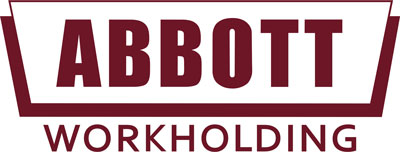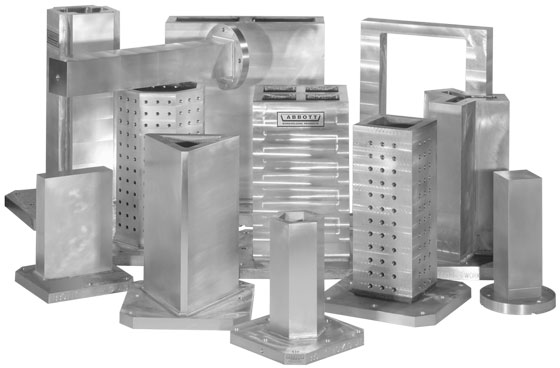Tenzaloy™ Tooling Columns (Tombstones)
Abbott tooling columns (Tombstones), made of Tenzaloy™ naturally aged to T-6 condition, provide a practical, inexpensive and lightweight means of holding work accurately in a vertical or horizontal plane for CNC machining operations. They can be mounted directly on a machine table/pallet or used in conjunction with a rotary table. Abbott tombstones are available in multiple shape configurations and can be machined to custom heights and base layouts.
Tooling Columns:
- Strong, Rigid & Lightweight
- Vibration Dampening • Corrosion Resistant
- Excellent Machinability
- Custom Sizes and Configurations Available
High Strength
Tenzaloy™ is a high-strength aluminum casting alloy that has tensile yield and elongation properties equivalent to the common heat treated alloys such as 195T6, 355T6 and 319T6. The impact strength of Tenzaloy™ is greater than any of these alloys, and in several instances the elongation is higher. Tenzaloy™ attains its strength by a natural aging process that gradually takes place at room temperature. The typical properties are reached after 10-14 days, and when testing for specification purposes, a 21-day period is used. Some slight further aging and strengthening takes place up to six months, at which time the alloy is stable and no further change of any kind takes place. Test bars held for six years at room temperature have shown that the properties remain constant.
Elimination of Heat Treatment
Because Tenzaloy™ is self-aging, no heat treatment is required. The first and most obvious advantage gained is the saving of the cost of the treatment and the extra freight often involved if the heat treating is being done outside the foundry. The process of heat treatment is far from a fool-proof operation, and is subject to many errors and failures (both man and machine). The solution heat treatment is carried out at as high a temperature as possible for maximum efficiency. This temperature is just below the melting point, and a common cause of difficulty is overheating due to faulty temperature control or hot spots in the furnace. This overheating often results in warped, cracked and, occasionally, melted castings, which are then a complete loss. The quenching operation which follows solution heat treatment can cause substantial problems with regard to warpage and cracking. When distortion occurs, the castings must be straightened—a troublesome operation which must be performed within a short time after quenching, while the castings are soft.
Stress-free, Full-strength Castings
If Tenzaloy™ is given a simple heat treatment of six hours at 468˚ C. and allowed to air cool (not quenched) it will age normally and result in a stress-free, fullstrength casting. This is not possible with any heat treated alloy. All castings of any alloy will contain internal stresses as a result of the casting process. The solution heat treatment cycle of the heat treated alloys will eliminate these cast stresses, but the quenching operation introduced much greater ones. Conventional T6 aging treatments do not relieve these stresses. Aging treatments which do relieve these quenching stresses (such as T71) result in inferior properties. The cast stresses can be relieved by a simple, one-step aging treatment (T5) but here again inferior properties result. Thus, through the use of Tenzaloy™, it is possible to obtain castings that have their full strength and yet are stress-free. This is important for uses where close dimensional and straightness tolerances must be maintained, especially where the castings are extensively machined.
Dimensional Stability
Tenzaloy™ is dimensionally stable and does not grow or increase in size as do the heat treatable alloys. Actually, fully aged Tenzaloy™ shows a very slight decrease in length of less than 0.025mm per 25.4mm. In contrast to this, heat treated alloys can increase in size as much as 0.10% to 0.15% (0.025mm to 0.038mm per 25.4mm).
Machinability
The machinability of Tenzaloy™ is exceptionally good—equal to the very best of aluminum alloys, such as the aluminum-magnesium types. The machinability is greater than the common aluminum-copper or aluminum-silicon heat-treatable alloys. Often it will be found that several machining steps can be eliminated because Tenzaloy™ attains a fine finish with fewer cuts. Also, Tenzaloy™ may be machined at the highest possible speeds. As can be seen from the mechanical property tables and aging curves, immediately after casting, the alloy is relatively soft and ductile. If machined at this point the castings will give the impression of being gummy. Even though many machining operations are performed soon after casting, best results will be obtained if the castings are allowed to age about five days. Although the typical properties are not reached until ten to fourteen days, sufficient hardening will have taken place in five days to materially improve machinability. Tenzaloy™ is readily polished to a high luster with a silvery-white color. The time when the ability to be polished will be best will vary somewhat with the preferences of the polisher. One who prefers a soft metal, easily smeared, will like to polish soon after casting. One who prefers a hard metal easily cut, will prefer a casting that has aged and hardened.
Anodizing
Tenzaloy™ can be readily anodized by standard procedures and will produce a white color superior to alloys containing copper and/or silicon. The anodized coating may be dyed any available color. It should be emphasized that the surfaces of sand castings in any alloy are prone toward porosity of many kinds, and that if coloring is being considered, the surfaces must contain a minimum of porosity for satisfactory dye application.
Brazing
Because of its high melting range of 607-652˚ C., Tenzaloy™ is one of the few casting alloys which can be brazed at temperatures of 552-607˚ C. Conventional techniques may be used, such as oven, torch or fluxbath dip methods. Tenzaloy™ can be brazed to itself, to extruded aluminum sections, or to other forms of the proper alloys.
Corrosion Resistance
Tenzaloy™ has excellent corrosion resistance, equivalent to the aluminum-silicon alloys. Tenzaloy™ compares favorably with other high strength alloys in that the alloy is not susceptible to acceleration of corrosion by stress (below 80% of the yield strength) nor to stress corrosion cracking. The alloy exhibited a negligible loss of mechanical properties after immersion in aerated 3% water solution of sodium chloride for ninety days, and the small surface attack that was present was found to be uniform without pitting. This uniformity of resistance is not encountered with the aluminum-silicon alloys commonly considered to be corrosion resistant.


